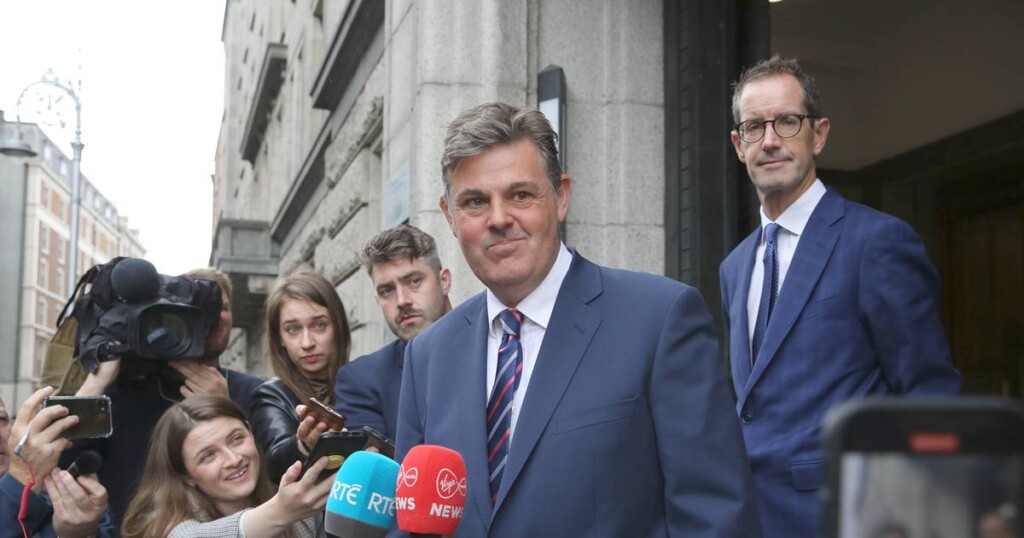RTÉ boss Kevin Bakhurst has told an Oireachtas committee that RTÉ faces a financial crisis.
Kevin Bakhurst said that if the state broadcaster did not receive a Government bailout by next spring, RTÉ would be insolvent.
The Montrose firm has €68 million on hand, the committee heard, but is expected to run at a deficit of €10 million to €12 million by the end of the year.
Bakhurst says the deficit could be paid with cash on hand, but a Government bailout would then become necessary to ensure the survival of RTÉ.
Bakhurst has stated in recent weeks that RTÉ needs a bailout to the tune of nearly €60 million to help solve financial issues, with RTÉ anticipating a revenue hit of over €20 million in lost licence fee revenue.
Public outrage and distrust at RTÉ following the Ryan Tubridy scandal has resulted in a record amount of people not paying or renewing their licence fee, which has caused a major financial headache for RTÉ.
“If we didn’t get this cash, we would run out of cash, that’s for sure,” Bakurst told the committee.
The prospect of RTÉ selling at least part or even their entire Dublin 4 campus has been floated as a potential way to raise funds, but Bakhurst has poured cold water on the prospect.
Discussing the prospect of a campus sale, Bakhurst said “we are awaiting more up-to-date valuations, but early indications are that a complete sale of the Donnybrook campus is unlikely, and the repurposing of the current site will not be without challenges and significant costs.”
Fine Gael TD Patrick O’Donovan claimed in recent weeks that selling part of the RTÉ campus could fetch north of €300 million and noted the successful output of Virgin Media in Ballymount as an example of a cost-effective way of running a major broadcaster.
O’Donovan’s party colleague, Senator Micheál Carrigy, claimed that RTÉ upping sticks out of South Dublin could be worth €500 million.
Speaking to the Sunday Business Post in September, Stephen Garvey, chief executive of homebuilders Glenveagh’s cast doubt on their assertions.
RTÉ have commissioned an independent valuation of what the value of their land costs, but Garvey doubts it is anywhere near the figure touted by politicians.
“I haven’t seen the entire land market in the first half of a year trade €300 million, so it’s a hefty price tag for one asset,” he said at the time.
The funding of RTÉ has become a hotly-debated political issue, with An Taoiseach Leo Varadkar stating in no uncertain terms that his Government would not grant RTÉ their requested funding until there are clear signs of reform and a commitment to transparency at the state broadcaster.
Last week’s Budget saw interim funding of €16m designated to RTÉ, but the Department Of Media said “the controversy surrounding inadequate governance and control processes at RTÉ has brought the importance of public service broadcasting, and the need to ensure that it is appropriately funded, into sharp focus.”
“The provision of any additional funding in light of the decline in TV licence revenues will also be addressed post-Budget and following submission of a new strategic vision by RTÉ,” a statement from the Department read.
“The question of putting in place a more sustainable long-term funding model for public service media will also be addressed in the first half of 2024.”
Minister Catherine Martin said “trust was shattered” between the public and RTÉ in the wake of the payment scandal, and it left people “shocked and outraged.”
Martin said she was concerned at “the serious cultural, control and governance issues” at the state broadcaster.
She acknowledged that “a number of positive actions have been taken by the Board and Director General over the past number of weeks”, and said that “comprehensive and far-reaching examinations” were underway.
A round of redundancies has been floated as a possible way for RTÉ to save money, but Bakhurst, as well as the National Union of Journalists, has dismissed those suggestions.
Bakhurst stated that there would be deep cuts to discretionary spending at RTÉ as it looks to tighten its belt, and further stated that compulsory redundancies were not the way to solve the revenue issue.
